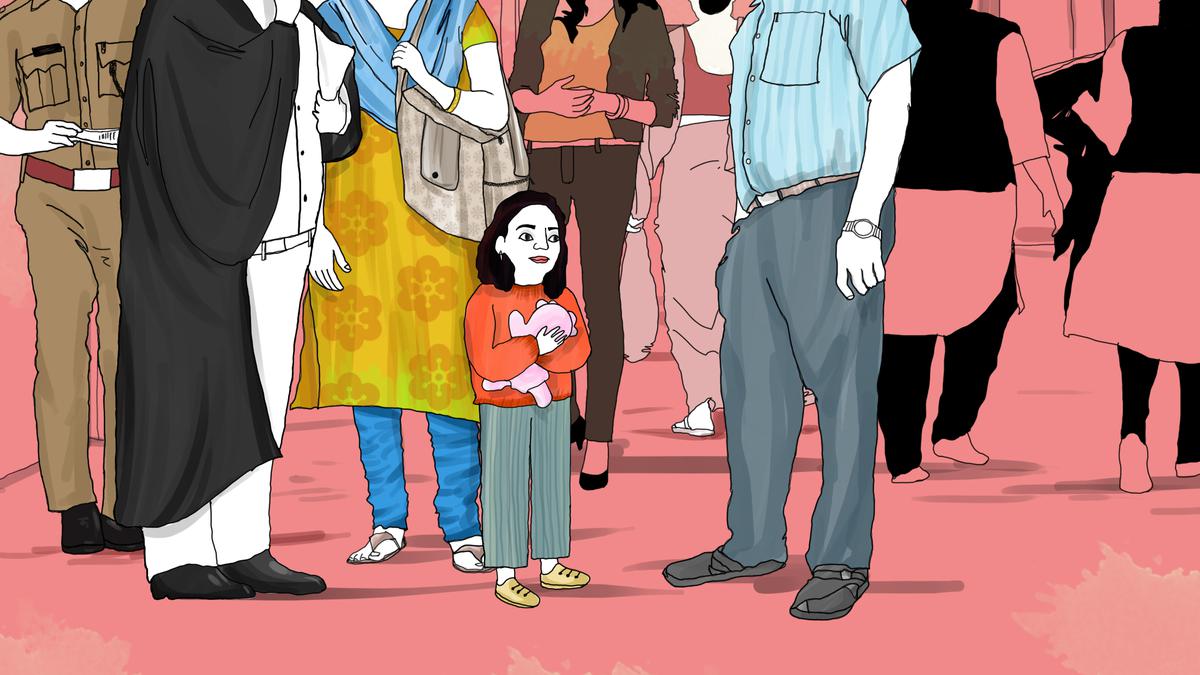
Family courts, where custody battles are fought, often during vacations, are traumatic experiences for children
The Hindu
Being ‘child friendly’ should not be about infrastructure alone, but a comprehensive justice system that also ensures psychological and legal support for children
During the summer months, when schools are closed for vacations, family courts in Kerala see a sharp spike in petitions for child custody. There are instances when children try to flee the premises, younger ones screaming, caught in the crossfire.
ALSO READ First child-friendly special court in Kerala to be opened today
For 18-year-old Sushmita*, a busy road in the heart of Thiruvananthapuram triggers nightmarish flashbacks. It leads to ‘Vanchiyoor kodathi’, the court complex in the State capital, where her parents fought an ugly divorce case in 2016. “The sight of the road brings back fear, anger and shame. My heart explodes with anxiety and I often skip that route to avoid the panic attack,” she says. Her mother, a government employee, had filed for divorce and the then 11-year-old Sushmita was totally unprepared for the ordeal that followed. She found herself at the centre of a bitter custody battle. “Amma used to take me even if my presence was not needed for some hearings as there was no one to take care of me. The arguments my parents had often spiralled out of control leaving me terrified,” she recalls.
In 2022, a division bench of the Kerala High Court had sought the possibility of setting up a separate child-friendly room in all family courts just like the Protection Of Children from Sexual Offences Act (POCSO) courts. “Unlike POCSO courts, the environment in our family courts is hardly child-friendly. In custody and maintenance cases, the children spend long hours in these buildings. There are women who come with babies and very few courts have feeding rooms or dedicated waiting rooms for children. Recently, a differently-abled child, who was severely upset over the unfamiliar surroundings, ran into the room when the court was in session. Court buildings should be equipped to accommodate such children,” says K.V. Manoj Kumar, chairperson, Kerala State Commission for Protection of Child Rights. “For most children, divorces and custody battles can be traumatic. Family courts should extend counselling services for them too,” he adds.
Karthik’s* (9) visits to the family court were not frequent, but enough to deepen his trauma. It started after the suicide of his mother; his maternal grandparents insisted it was a murder. Coming from an underprivileged background, they couldn’t pursue the case, but when the father filed for custody of Karthik and his three-year-old sister, they sought the help of the District Legal Services Authority. The children witnessed their father abusing their elderly grandparents and threatening to kill them. The emotional scar was so severe that the boy needed psychiatric care.
Advocate J. Sandhya, who handles cases relating to women and children, and a former member of the Child Rights Commission, says these courts were established under the Family Courts Act 1984 that follow legislation that goes back to a period when the concept of ‘child rights’ had not yet emerged.
“Subsequent to Article 12 of the UN Convention for the Rights of the Child, which India ratified in 1991, there were changes in child-related legislation,” she says. “Acts such as the Juvenile Justice (Care and Protection of Children) Act 1915, and POCSO, came into existence and the system was made more child-friendly.” According to these later pieces of legislation, the child needs to be ‘provided the opportunity to be heard in any judicial and administrative proceedings… either directly, or through a representative or an appropriate body, in a manner consistent with the procedural rules of national law’. “But though it assures the children the right to be heard and participate, their interests are mostly not given any weightage in family courts,” Sandhya adds.

Capt. Brijesh Chowta, Dakshina Kannada MP, on Saturday urged Union Finance Minister Nirmala Sitharaman to facilitate speeding up of ongoing critical infrastructure works in the region, including Mangaluru-Bengaluru NH 75 widening, establishment of Indian Coast Guard Academy, and merger of Konkan Railway Corporation with the Indian Railways.

Udhayanidhi Stalin urges cadres to launch campaign for securing 200 seats in 2026 Assembly elections
Udhayanidhi Stalin urges DMK members to gear up for 2026 Tamil Nadu elections, aiming for 200 seats.









